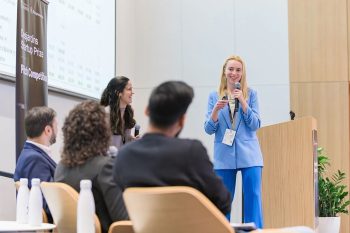When incoming engineering science (EngSci) students start classes next week, one of the first mentors they meet will be an international award-winner.
Professor Rob Irish (ISTEP) has taught courses across all of the Faculty’s departments, divisions and institutes for 24 years. His commitment and innovation in engineering education recently garnered him the Ronald S. Blicq Award for Distinction in Technical Communication Education from the IEEE Professional Communication Society.
The award recognizes innovative educators with significant reputations in influencing the ways that technical communication is taught.
“I love the students here, it’s a treat and a privilege to work with students who are so smart, diligent and ready to work,” says Irish. “I’m game for the sometimes-challenging questions they ask when they apply their knowledge to problems – I welcome it.”
Irish says that he particularly enjoys working with students in their first year, ensuring that they start off their academic journeys on the right foot. And since the inception of the Praxis course, designed especially for first-year EngScis, he has worked closely with Professor Jason Foster (EngSci) to develop their foundational skills in communicating logic- and evidence-based reasoning.
Irish explains that his teaching philosophy has always been to teach through active engagement. “I acknowledge that in the areas that I teach, primarily in the Engineering Communication Program (ECP) and in the Praxis course, that students need to ‘do,’” he says.
Sometimes that means letting students flounder a bit. For Praxis, first-year students are given a unique and complex challenge of working in teams to collaborate with Toronto communities, agencies and companies to identify — on their own — innovative approaches to improve their city.
“We don’t give them explicit instructions on what goes where in the assignment – there’s no template, there’s no specific structure. It frustrates some of them terribly,” explains Irish.
“Of course, as teachers we try to guide them to the right kind of uncertainty. But there is real value in a bit of that struggle, it gets students to understand not just engineering concepts, but a deeper understanding of how to organize ideas, and lets them reflect on the decisions they had to make to get to the solution.”
By the end of the term, the results speak for themselves — student projects include redesigning naloxone kits to address the ongoing opioid epidemic, and a monitoring tool to improve Toronto firefighters’ navigation during active fires, to name a few.
Communication skills — which have long been a touchstone of education at the Faculty — are increasingly important as engineers are required to take on larger and more complex societal challenges. Irish, who is appointed to the Institute for Studies in Transdisciplinary Engineering Education and Practice (ISTEP), is ready to equip students with the necessary skills.
That means spending this summer developing new approaches to teaching. “There’s a balance – you want to push innovation, but you want to pause and reflect and ask, how did that work? I’ll wait and see after this term,” he says.
“If you’re not trying new things and innovating, then where does the joy of teaching come from? I don’t think we are always teaching perfectly. That means there are always new ways to push students towards excellence.”



